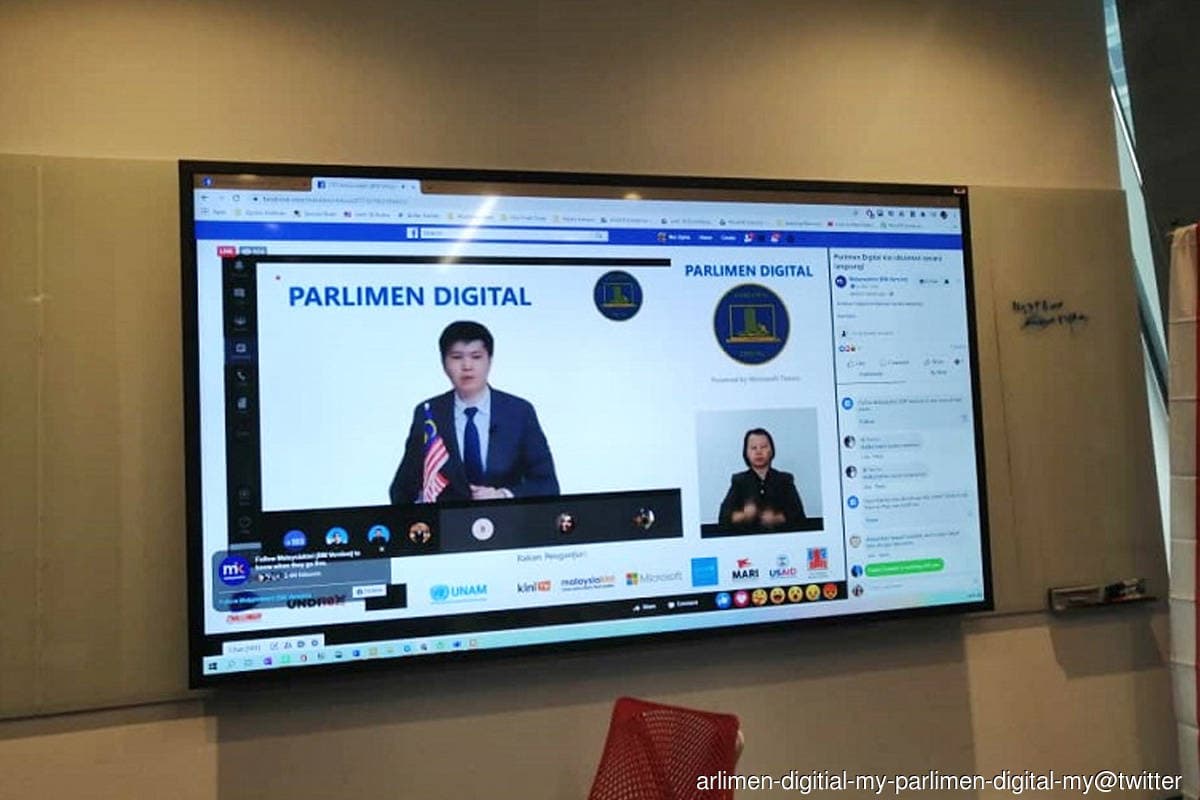
KUALA LUMPUR, (July 13): A simulated online parliament held recently surprised everyone by proving to be free of the boisterous conduct that has disrupted Dewan Rakyat sittings on many occasions.
The youth-led Parlimen Digital held on July 4 and 5, by contrast, was not marred by unpermitted interjections, cheers and jeers, which was witnessed by over 192,000 viewers, including prominent politicians.
“We were prepared for rowdy, and we got polite,” said Jean Vaneisha of Challenger Malaysia, one of three groups that set up the virtual parliament, believed to be a first for the country. The other organisers are Undi18 and Liga Rakyat Demokratik (LRD).
The Dewan Rakyat, in comparison, has been in uproar on numerous occasions over unparliamentary behaviour such as name-calling, vulgarity, defiance of the Speaker and other appalling conduct.
The organisers were prompted to hold the online mock parliament after the Dewan Rakyat sat for just half a day on May 18 for the King to deliver his royal address. The Speaker Tan Sri Mohd Ariff Mohd Yusof said the government took the decision not to have a sitting because the Covid-19 pandemic had yet to subside.
The move was criticised by opposition MPs and civil rights groups because a number of other countries were holding virtual parliament sessions in keeping with democratic practices. This was a point of contention especially because the sitting of May 18 was the first time parliament was convened following the change of government in February.
The organisers were motivated to show that it was technically feasible to conduct a virtual parliamentary session and that orderly and productive debates could be held online to get around restrictions that were necessary because of the pandemic.
“This (virtual parliament) is the future. It may not be the near future but it is extremely likely that we will have very good internet connectivity coming up,” Parlimen Digital technology lead Eshaan Menon told edgemarkets.com.
The whole idea of virtual parliaments is still at its infancy, and technological advancements could eventually eliminate its shortfalls to perfectly simulate the physical experience.
A virtual parliament works just like a video call, said Challenger’s Vaneisha. The Parlimen Digital event involved 222 representatives, one for each parliamentary constituency.
The representatives joined the Microsoft Teams call with their microphones and cameras turned off until called upon to speak. The Speaker of the House had the same powers of control as in a real parliament. Representatives had an allotted time to speak, and procedures were also put in place for submitting questions to the Speaker. Voting on the motions was then conducted through an online poll.
“It’s effectively taking what you do in person at a parliament, online,” said Menon.
One worry was whether real life parliamentarians, with a median age of 55, would be able to adapt to this mode of communication. However, the Covid-19 pandemic has spurred the adoption of tele-conferencing as a standard practice for a full range of uses, from business communications to education to social networking.
Parlimen Digital conducted trial runs to get participants to familiarise themselves with a remote meeting. The organisers report that getting participants to login through the two-factor authentication security process was particularly challenging.
All said, the event largely achieved what it was supposed to: the technology worked, and two motions were discussed and voted on with minimal disruption. There were minor issues, most prominently audio-visual glitches and, to a lesser extent, “MPs” being occasionally cut off while speaking and random background noises.
"We did this in about a month and under the budget of a single MP's monthly salary (RM16,000). Can you imagine what would happen if a ministry took this on with the necessary machinery and the funding. If we can do it, why can't they?" said Vaneisha.
Calls for virtual parliaments have been gaining traction worldwide in response to social distancing and travel restrictions introduced to contain the pandemic. The UK was quick to adopt a hybrid parliament with around 50 MPs allowed in the House of Commons while the remainder teleconference from home. Brazil and Canada have also embraced legislating remotely.
Commenting on whether remote sittings dampen the spirit of parliamentary debate, the UK’s Labour MP Chi Onwurah told the media portal Vox: “It loses some of the atmosphere, and it loses the spontaneity.”
The Parlimen Digital team see the civility of the proceedings as a strength of an online sitting.
The virtual sitting designates a time for each MP to speak, pinned on the big screen as the centre of attention, while others mute themselves.
“You feel heard, and to know that you have a turn to speak, you're less likely to attack each other so you can focus more on the ideas and policy-making because the system itself makes sure that you have a space to say your bit,” said Vaneisha.
A virtual parliament has relevance not only as a means of enabling the business of parliament to be conducted despite constraints like a public health emergency, say the organisers.
"It's also empowering for people you wouldn't necessarily see run for office,” said Vaneisha on the inclusivity of a remote legislature for women and young people. Having an online parliament allows people like working mothers to carry on with their lives while serving as lawmakers, she said.
Parlimen Digital participants, who are youths, were allegedly contacted by local police from several constituencies via social media, prompting civil rights advocates to criticise the action as uncalled for. However, Inspector General of Police Tan Sri Abdul Hamid Bador was reported to have denied that the police had called up the participants for questioning.
“I checked internally and I was informed no one was called up," he was reported as saying by the Star Online.